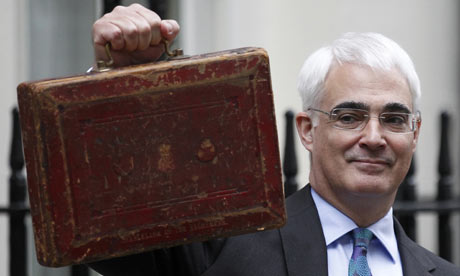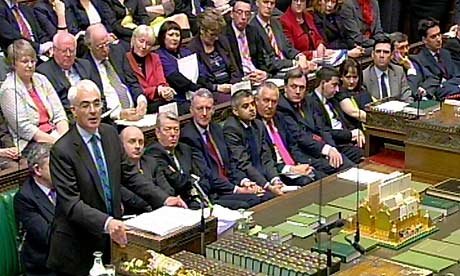Bosses at the Royal Bank of Scotland and Lloyds Banking Group will be stripped of their bonuses if they fail to meet the £94bn lending targets set out in the budget, the chancellor warned yesterday as the taxpayer started to make a profit on its stake in Lloyds Banking Group.
In a document published alongside the budget, UK Financial Investments, the body which looks after the taxpayer's stakes in the bailed-out banks, produced fresh estimates for the break-even point on Lloyds, cutting the share price from 73.6p to 63.2p. The revision is to take account of the £2.5bn fee Lloyds paid to exit the government's asset protection scheme which UKFI calculates cuts the taxpayer's investment in Lloyds from £20bn to £17.5bn.
At last night's closing price of 64.2p, this revision meant the taxpayers' losses on Lloyds had been reversed into paper profits – and might make it easier for the government to prepare share sales in the bailed out bank. The break-even for RBS, in which the taxpayer has invested £45bn, was revised from 50.2p to 49.9p because of fees it had paid. Shares closed yesterday at 44p.
However, any decision on selling shares will be for the next government as there is not enough time for any sales to be prepared ahead of the election, expected on 6 May.
Darling said: "We will sell our shares in RBS and Lloyds as well as Northern Rock in a way that maximises value for the taxpayer and recoups the money we invested. We intend to get all taxpayers' money back."
After he had spoken, Northern Rock announced that its "bad" bank – Northern Rock's asset management arm – would be merged with the Bradford & Bingley mortgage books owned by the taxpayer.
"The intention is to create a single holding company that will own NR(AM) and B&B under common governance and management with the aim of maximising value for taxpayers," Northern Rock said
The government also made it clear that it hoped to sell the "good" part of Northern Rock to a buyer who could use it as a "springboard for growth from an existing branch network, mortgage platform and retail deposit book".
Darling was also forced to admit that his early estimates for the one-off 50% tax on bankers' bonuses were far too low and that instead of raising £550m it had actually brought in £2bn. He is using this windfall to fund his £2.5bn growth package to stimulate the ailing economy.
Darling had expected banks to reduce their bonus payments to avoid the tax which is due on bonuses of more than £25,000, but the banks instead kept paying bonuses and hiked them by 25% on 2008-2009 levels. In the wider financial services sector, bonuses were 15% higher, the Treasury said.
The chancellor also tried to show that he was putting the bailed-out banks to work by demanding they lend £94bn to businesses and households in the next year to March.
However, these targets may not be regarded as particularly stretching. Lloyds has to lend £44bn to businesses on a gross basis – that is, without taking account of loans repaid – after lending £38bn in the 12 months to end-March, and £3bn extra of mortgage lending. RBS must lend £50bn to businesses, compared with £41bn last year, and £8bn more to the mortgage market.
The Treasury confirmed that both banks had missed their lending target to businesses for the current year. Net lending at RBS was a negative £6.2bn – showing that it actually received more money than it lent out – while at Lloyds it was a positive £5.7bn.
If they fail to meet their new lending targets the government tells UKFI to "work with the remuneration committees of the relevant banks to determine the appropriate consequences of the breach". Currently only RBS chief executive Stephen Hester's pay is linked to lending.
Darling said the banking system had paid £8bn in fees and charges for the taxpayers' support that stopped the banks collapsing in October 2008.
The chancellor also put the banks on notice that the government had not given up on his idea for an "international systemic tax on banks", adding: "This must be brought forward quickly as I will urge international financial ministers in Washington next month. I agree with all those who think that such a tax should be internationally co-ordinated."
In a swipe at the Conservatives, who pledged to introduce a tax regardless of other countries, Darling added: "Going it alone would cost thousands of jobs, not just in London, but across the country."
Even so, he disappointed campaigners for a "Robin Hood" transaction tax who had hoped for a commitment to this broader levy.
He also set out plans to bolster competition in the banking sector by allowing the Financial Services Authority to speed up the time it takes to authorise banks. The government is also demanding banks make sure that the 1.75 million people who do not have simple accounts are given the chance to open one.










